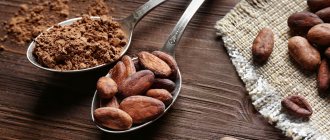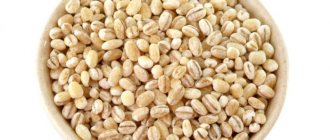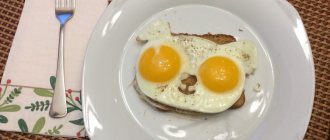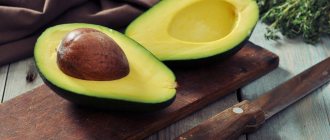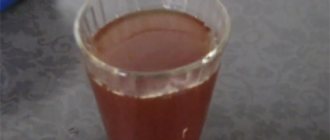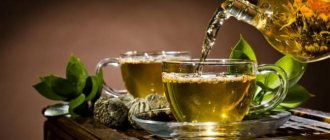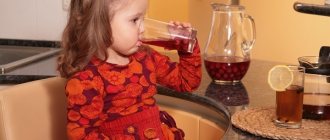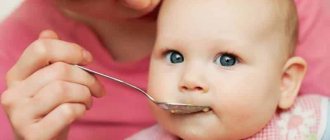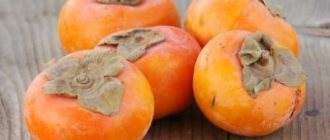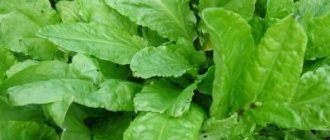According to modern pediatricians, the body of a newborn baby does not need additional fluids other than breast milk or formula. The newborn period is conventionally 28 days, that is, the first month of a baby’s life. After its completion, you can introduce tea and water into your diet. However, the question of whether this is necessary is quite controversial. Many doctors believe that if the baby is exclusively breastfed, there is no need to give him additional water. Others recommend giving tea without fail. But this is not what our article will talk about. We will simply tell you about tea from the first month of life, about its beneficial properties and types presented on the Russian market.
Benefits of tea
Black, green or herbal tea invigorates the body and gives an adult a boost of energy for a long time. It quenches thirst well. Other positive properties of the aromatic drink are also known:
- reduces appetite due to the presence of tannins;
- normalizes metabolism;
- strengthens the immune system;
- contains minerals (zinc, fluorine, magnesium and potassium), vitamin C, B vitamins, antioxidants;
- helps eliminate the effects of diarrhea, restore water balance;
- relieves swelling;
- prevents the formation of kidney stones.
On a note. By adding honey, lemon, berries and herbs, tea acquires medicinal properties and helps fight insomnia, colds, fatigue and stress.
Composition and calorie content
For over 200 years, scientists have been studying the components of tea and their effect on the human body, but so far not all of them have been identified and studied. One thing is clear: the chemical composition of this plant is complex, because about 300 substances contained in tea are already known. 50% of them are water soluble. Black tea contains about 40% of such substances.
The nutrients in black tea are:
- vitamins A, K, PP, B1 and B2;
- amino acids;
- essential oils;
- tannins (tannins);
- caffeine;
- alkaloids;
- carbohydrates;
- enzymes;
- organic acids.
Mineral composition of black tea:
- magnesium;
- potassium;
- iron;
- fluorine;
- copper;
- calcium;
- sodium;
- zinc;
- iodine.
Some of the most influential nutrients in black tea include:
- caffeine, the content of which in 100 g of drink, depending on the type of tea, is 1.8-3.5%;
- tannins, making up 8-19%;
- essential oils, occupying 0.006-0.021% in 100 g of drink.
One cup of black tea contains 5 kcal, while the energy value of 100 g of dry tea leaves is 150 kcal.
Harmful properties
The question of how many months you can give your baby tea is one that worries many mothers and grandmothers for good reason. At an early age, this drink easily causes hyperactivity, insomnia, excitability and rapid heartbeat in children. It can cause allergies, nightmares and involuntary urination.
Another disadvantage is the ability of tea leaves to stain tooth enamel. Any tea often provokes anemia in children, memory impairment and the deposition of harmful salts in the body. That is why pediatricians do not advise giving the drink to infants under one year old, and in the presence of diseases - even to older children.
Harm or benefit to children?
Since ancient times, tea has been considered a healing drink that is good for health. It can quench thirst in hot weather, become a source of energy and vigor for the whole day, and help cope with fatigue.
The vitamin composition and tannin of black tea provide it with the properties of a natural antioxidant, which helps cleanse the body of toxic substances and improve immunity.
These beneficial properties of black tea are undeniable for adults. What about children?
Early introduction of tea into a child's diet is fraught with negative consequences for the baby's body, which can develop gradually and be subtle to parents. The effects of tea will appear in the future, but even doctors will find it difficult to associate them with the baby drinking tea too early.
Such consequences may be:
- nervousness, increased excitability, hyperactivity of the child;
- restlessness, lack or decreased concentration of attention;
- various types of allergic reactions;
- sleep disturbance such as insomnia;
- nightmares;
- poor memory, which affects school performance;
- tendency to fantasies, deceit.
Experts explain such manifestations by the negative influence of the nutrients contained in tea (tannins and other components) on the insufficiently formed cerebral cortex.
According to cardiologists, caffeine is the enemy of the heart. If a child starts drinking tea early or consumes it in excess of the norm, this can cause cardiovascular disease.
Tea tannins (tannins) combine with iron and thereby interfere with its absorption in the digestive tract, which can cause anemia in an infant.
The caffeine in tea is bound to tannin to form theine. Theine differs from free, unbound caffeine in its milder but longer-lasting action. It has a stimulating effect on the nervous system, so instead of napping during the day, the child is awake, in an excited state, and capricious.
Theine can cause not only increased secretion in the stomach, acceleration of metabolic processes, increased heart rate, but even an increase in body temperature. Sensitivity to theine is higher in children than in adults. Theine leads to disruption of the synthesis of vitamin D in the body, thereby contributing to the development of rickets in a child.
The diuretic effect due to other tea alkaloids in infants can lead to an imbalance in the water-salt balance. Purine bases, contained in tea in significant quantities, lead to increased formation of uric acid and its salts. And the immature urinary system in the first year of life is not able to remove them from the body. Uric acid that accumulates in the child’s blood also increases the baby’s irritability and excitability and can cause skin rashes and repeated vomiting.
Another organic acid contained in tea is oxalic acid, which combines with calcium (there is quite a lot of it in milk). Therefore, when tea is given to a baby after feeding, calcium neutralizes acid and prevents its accumulation in the blood.
If the child is given tea between feedings, then oxalic acid combines with calcium in the tooth enamel, which leads to tooth decay and the accumulation of insoluble salts in the urine and blood. The enamel of baby teeth accumulates coloring pigments from tea.
Consequently, those properties of an invigorating drink that are beneficial for adults and older children can cause serious consequences and cause significant harm to health in infants.
When can you give tea to your baby?
Real freshly brewed black tea in its usual sense is not recommended for children under 1.5-2 years of age; green tea, due to its high caffeine and tannin content, is prohibited for consumption until the age of ten. There are also special children's preparations containing vitamins, herbal and berry extracts. This tea is suitable for children from 1 month. It may contain mint, cumin, fennel, vitamins C and B. Such preparations are called “gastric”, they eliminate problems with the digestive system of infants: constipation, bloating, colic.
If you have allergies or a cold, you can brew tea for infants from 1 month of age, containing chamomile. The plant has an anti-inflammatory effect. From 4 months, it is allowed to give infants a brewed mixture based on lemon balm and linden to calm them down.
On a note. It is allowed to add a mixture of several herbs to herbal tea for a 6-month-old child; the dosage should start with 1-2 teaspoons to prevent allergies.
Brewing rules
You can only brew your child black tea, which contains the least amount of tannin and theine. It's better to hold off on red and green. Here are a few rules that must be followed.
- It is forbidden to brew bagged teas for your child due to the presence of additives and harmful impurities. They can cause allergies, diarrhea, and stomach upset.
- Half a teaspoon of tea leaves should be poured into a glass of hot boiling water so that the drink is not too strong. It should be left for 2-3 minutes, then it is recommended to strain through a sieve.
- Each time you need to take fresh tea leaves, as harmful formations appear in the standing liquid. It is desirable that the drink be weak, warm, and light brown in color.
- It is allowed to give the baby a brewed invigorating mixture in the morning, and a herbal one before bedtime for a calming effect.
How to brew and what to serve with
A children's drink requires less brewing than an adult's. You cannot brew tea bags, flavored and cold.
How to properly brew green tea for children
Important. The bags are filled with low quality raw materials (tea crumbs, small twigs and broken leaves). Such a drink will be bitter and will not have any benefit (harmful). Flavored and iced tea often contains harmful artificial substances (at this age, the body needs only natural substances).
It must be infused for one to two minutes so that the strength of the decoction is weak. You can add milk to reduce the increased stimulating effect. From three to five years, the amount of milk should be half of the total drink.
Honey, candied fruits, nuts and dried fruits will help replace sugar. Adding sugar to such a decoction is harmful, even for an adult body.
The drink can only be brewed from high-quality large-leaf raw materials. Pre-rinse the brewing container and cup with boiling water. The water temperature during brewing should be between 80 and 90 degrees Celsius. Before serving it to your child, cool the broth to 50 degrees. It is important not to burn your mouth and stomach.
Types of children's tea
All types of children's tea are divided into two groups.
Therapeutic and prophylactic. They have a calming effect, help with stool upset, excitability and restless sleep. Contains anise, chamomile, fennel, mint. Preventive. Strengthen the immune system, contain vitamins, extracts of plants, herbs and berries - rose hips, black currants, lingonberries, raspberries. On a note. Popular among mothers are “Babushkino Lukoshko”, “Bayushki-Bayu”, and granular formulations of the Hipp brand. They include thyme, raspberries, linden blossom, fruits and herbs, which have different effects on the children's body.
Sheet
Leafy herbal infusions are prescribed for teething, abdominal pain, poor sleep or restless behavior of the baby. They have a calming effect and help fight colds. You can give such drinks to children on a regular basis only from 3 years old.
You can independently collect and brew with boiling water the leaves of currants, cranberries, mint, lingonberries, chamomile flowers, and calendula. All parts of the plants should be dried, crushed, and stored in a dry, dark place. If desired, it is easier to buy ready-made formulations at the pharmacy.
Green
Scientists have not fully studied the properties of green tea, so pediatricians advise not to give it to children under 3-5 years of age. The drink can have a strong tonic effect on a fragile child’s psyche and lead to gastric disorders due to the high content of essential oils.
Black
It is considered the most harmless, it is allowed for use from 4 months with the addition of a small amount of tea leaves, the absence of sugar and flavorings. Breastfed newborns are given the drink after a year, while bottle-fed infants are given a teaspoon at 2-3 months in the absence of contraindications.
Acceptable norm for children
Having studied how many months you can give tea to a baby, you should not forget about the permitted dosages.
- Up to 3 years of age, it is recommended to drink it not every day, but only 3 times a week. The volume should not exceed a third of a glass per day.
- Children 3-6 years old are allowed to drink 100 ml daily.
- After the age of seven, you can increase the strength by pouring a teaspoon of tea leaves with 200 ml of water per serving.
Contraindications
Contraindications for use in childhood are:
- increased sensitivity to caffeine;
- food allergies;
- individual intolerance to the components of the brew;
- hyperactivity;
- diseases of the gastrointestinal tract (gastritis, ulcers);
- prolonged insomnia;
- elevated temperature;
- kidney diseases;
- age up to 3 years.
Popular tea recipes with additives
Introducing liquids with additives into a child's diet can be beneficial, but you should follow a few simple rules:
- When brewing, do not add blueberries or citrus fruits, which are considered strong allergens;
- exclude varieties with flavors and dyes, such as mate, pu-erh, hibiscus;
- Be sure to consult a pediatrician before introducing the supplement;
- If allergic reactions occur, stop taking immediately.
Milk
It is allowed to be administered to children from 2-3 years of age in preschool and school age. Initially, you should use a mixture of 1 part milk and 1 part weakly brewed tea; after getting used to it, you can pour liquids in any quantity. Boiled milk neutralizes tannins and oxalates and prevents teeth from turning dark.
Ginger
Ginger drink normalizes digestion processes, helps with nausea, dizziness, colds and rhinitis. It helps strengthen the immune system and relieve cough more quickly. To prepare, grind a piece of ginger root 2-3 cm long and pour in 0.5 liters of boiling water. Leave covered for an hour; if there are no contraindications, add a little honey and a few drops of lemon juice.
Raspberries
This sweet berry improves appetite, has a beneficial effect on the child’s digestive system, and helps fight fever during colds. To prepare, the tea leaves are mixed with an arbitrary amount of dried or fresh raspberries, poured with boiling water and left for about 10 minutes.
Thyme
A drink with thyme improves immunity, contains vitamins, minerals, organic acids and other beneficial substances. Upon reaching the age of two, you can use it to treat ARVI, rhinitis, and influenza in children. When brewing with boiling water, add a teaspoon of crushed leaves to the black tea leaves.
Lemon
An aromatic liquid with lemon prevents any colds. Add a slice of lemon or squeeze out a teaspoon of juice to ordinary weakly brewed, half-cooled tea, sweeten with sugar or honey. Lemon can be introduced into the diet only if the child is not allergic to citrus fruits.
How to introduce black tea into your diet
When the baby gets older (2-3 years), and doctors allow the introduction of tea into the diet, it should under no circumstances be bagged. The properties of tea bags have been known for a long time, so it is better to avoid brewing them for a child.
When introducing the drink into baby food, you should follow some recommendations for its use and take into account that:
- the daily volume should be no more than 100-150 ml of warm drink;
- tea should be freshly brewed black. It is necessary to prepare a very weak, light-colored brew;
- to neutralize the effect of substances harmful to the baby, tea for children can be diluted with milk in equal parts;
- healthy additives such as honey and lemon can cause an allergic reaction;
- If a child drinks tea from a bottle, the added sugar can cause bottle tooth decay.
For children of all ages, berry-fruit or some herbal teas will be the most beneficial. They should be administered to young children with caution according to the schedule prescribed by the pediatrician in order to notice possible allergic symptoms in time.
Tips for parents
- It is better to buy black tea for children in a specialized store, carefully studying the preparation technology and the expiration date on the packaging.
- There should not be any flavors, additional ingredients or fragrances in the composition.
- The packaged one should be immediately put back on the shelf; only sheet, granulated will do.
- Liquid should be introduced into the diet carefully, one teaspoon at a time, gradually increasing the volume of the cup.
- When brewing herbs, berries, pieces of fruit, it is worth monitoring the absence of an allergic reaction in the baby for several days.
- If the baby has a fever, you should not give tea drinks - the temperature will rise even higher.
- The preparations should be drunk warm: hot ones damage tooth enamel, cold ones are poorly absorbed.
If you follow all the brewing rules and recommended dosages, you can increase the child’s body’s resistance to various infections, eliminate abdominal pain, and improve the baby’s healthy sleep.

